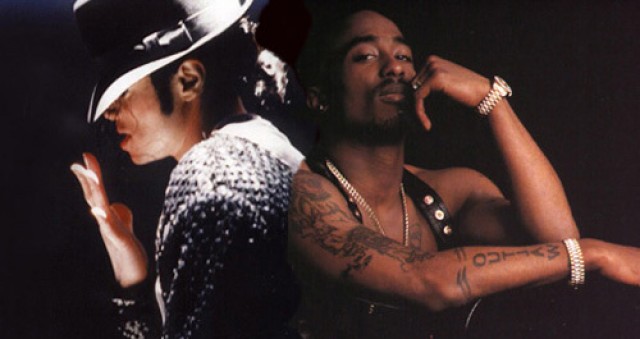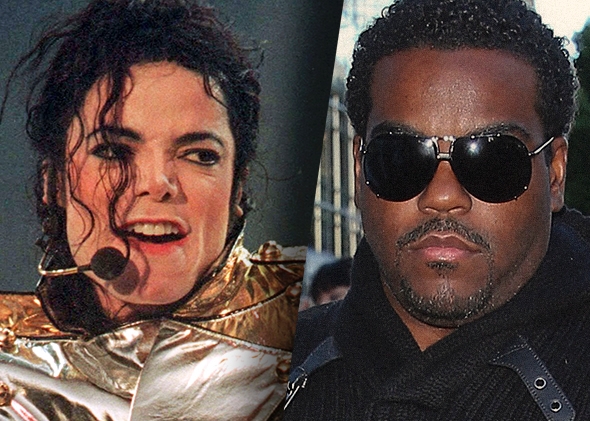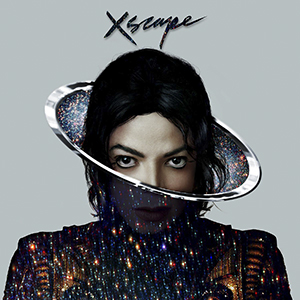The New Michael Jackson Album "Xscape" Does Not Suck
Das neue Michael Jackson Album "Xscape" enttäsucht nicht
Forget what you heard; we actually heard the music.
Last night a select group of music execs, press, radio, TV, and representatives of the Michael Jackson estate gathered at the Top of the Rock in NYC for a chance to hear Xscape, the second Michael Jackson album to be released since his tragic death in June 2009. During the ride to the top of Rockefeller Center, a ghostly image of Michael Jackson peered the down through the elevator’s glass ceiling. “Michael would approve,” quipped Fab 5 Freddy, one of the invited guests on the way up.
Upstairs there were magnificent views of Manhattan, signature cocktails, and elegant hors d'oeuvres. But first the guests were compelled to checked their phones (and submit to a metal detector sweep) all in an attempt to prevent digital piracy of the precious audio assets being unveiled that evening. But despite Epic Records’ best efforts, the album's poppin' title track leaked this morning. Normally this would be bad news for the album roll-out, but in this case the music provides a powerful retort to all the cynical criticism that has dogged this project since it was first announced.
“Xscape” was written by MJ and Rodney “Darkchild” Jerkins, most likely for the Invincible sessions. The track was recently “contemporized” by Jerkins—making it the only one of Xscape's eight cuts to be reworked by its original producer. The rest of the album's creative team includes Timbaland, Stargate, and longtime Jackson family friends Jerome “JRoc” Hamilton and John McClain—who were responsible for updating eight never-before-heard songs from the Jackson vaults, with the aim of giving them "a fresh, contemporary sound that retains Jackson’s essence and integrity," as the press release put it. Based on an informal poll of guests at the party, the prevailing attitude in the room was somewhere between curious and cautiously optimistic.
Sylvia Rhone, the newly appointed President of Epic Records, kicked things off by recalling her own favorite Michael Jackson moment—when she was “the hottest chick on campus” at Penn University and got the chance to see The Jackson 5 at the Spectrum in Philadelphia. She then introduced her boss, Epic Records Chairman/CEO Antonio “L.A.” Reid, who assured her that she was still the hottest chick in the place before calling up representatives of the Jackson estate and presenting them with a plaque so enormous it required two strong men to lug it onstage, commemorating over 100 million copies (and counting) sold of Thriller, the biggest selling album of all time.
Despite the fact that it's named after an awesome So So Def girl group, advance press on Xscape, which is due to drop May 13, had been overwhelmingly negative. As with the posthumous 2010 album Michael, knee-jerk news reports (written without hearing any of the music) characterized the songs as cutting-room-floor rejects polished up for purely financial motives—a notion that Antonio “L.A.” Reid wasted no time rebutting. “This is not about record company greed,” he said defiantly. “I knew Michael. I had the chance to spend time with him and I knew how he felt about his work, about breaking new ground and not repeating himself.” The estate reps pointed out that “Michael would not put a vocal down on a song if he didn’t love it,” and that the song “Wanna Be Starting Something” was originally recorded for the album Off The Wall and released later, ditto for “Earth Song,” which was originally written for Dangerous.
Then it was time to let the music play, and suddenly the only words that mattered were the ones Michael was singing. L.A. kicked things off with a sureshot dance-floor filler called “Love Never Felt Like This Before.” There were songs about cheating and double lives, and even darker cuts like "Slave To The Rhythm" a song about the trials of an unappreciated woman, and the “Do You Know Where Your Children Are?” which tells the tale of a 12-year-old runaway and features a haunting refrain of MJ singing “Save Me” over and over. Happily, the “contemporized” production on Xscape not so over-the-top that it distracts from the main attraction here, Michael’s superior songwriting and one-of-a-kind vocals.
Dann war es Zeit die Musik spielen zu lassen , und plötzlich waren die einzigen Worte , die zählten was Michael sang . LA gab einen Dancefloor- Füller namens " Love Never Felt Like This Before" frei . " Es waren Lieder über Betrug und Doppelleben , und noch dunklere Seiten wie " Slave To The Rhythm ", ein Lied über die Schwierigekeiten einer unbeacheten Frau , und " Do You Know Where Your Children Are? ", die die Geschichte einer 12 -jährigen Ausreißerin erzählt und bietet eine eindringlichen Refrain wo MJ singt " Save Me" immer und immer wieder. Glücklicherweise ist die
" zeitgemäß " Produktion auf Xscape nicht over-the -top , so dass es nicht ablenkt von der Hauptattraktion , Michaels überlegenen Songwriting- und einzigartigen Gesangsqualtitäten.
Up high on one of the windows was a quote in bold letters that speaks to MJ's creative process. "It's about the thrill of adventure. They love going somewhere they've never been. And we love taking them there." How many recording artists today are even aspiring to do that for their listeners? Contrary to what Kanye West said on "All of the Lights," MJ isn't exactly dead—not as long as he still can make your pulse race by hitting a note with just the right touch of grit in his voice. Almost five years after his outrageously untimely death, the King of Pop's ability to move the crowd endures. He's still a thrilla.
Hoch oben auf einem der Fenster war ein Zitat in fetten Buchstaben , die den kreativen Prozess MJ wiedergeben . "Es geht um den Reiz des Abenteuers. Sie lieben es irgendwo hinzugehen wo sie noch nie gewesen sind . Und wir lieben es sie dort hinzubringen . " Wie viele Künstler sind heute noch bestrebt dass für ihre Zuhörer zu tun? Entgegen dem, was Kanye West auf "All of the Lights " sagte, MJ ist nicht gerade tot , nicht solange er noch Deinen Puls erhöhen kann , indem er eine Note mit genau dem richtigen Hauch n seiner Stimme macht.. Knapp fünf Jahre nach seinem unverschämt frühen Tod ist der der King of Pop weiterhin in der Lage die Menge zu bewegen. Er ist immer noch ein Thriller.














 klingt - typisches Ächzen und Juchzen inklusive.
klingt - typisches Ächzen und Juchzen inklusive. A holographic image of Michael Jackson performs onstage during the 2014 Billboard Music Awards at the MGM Grand Garden Arena on May 18, 2014 in Las Vegas, Nevada.
A holographic image of Michael Jackson performs onstage during the 2014 Billboard Music Awards at the MGM Grand Garden Arena on May 18, 2014 in Las Vegas, Nevada. 
 Rodney Jerkins worked with Michael Jackson on the original "Xscape" from 1999 to 2001. Photo illustration by Slate, photos by Reuters, Brendon Thorne/Getty Images
Rodney Jerkins worked with Michael Jackson on the original "Xscape" from 1999 to 2001. Photo illustration by Slate, photos by Reuters, Brendon Thorne/Getty Images









 Michael Jackson. Foto: Cover Media
Michael Jackson. Foto: Cover Media
Kommentar